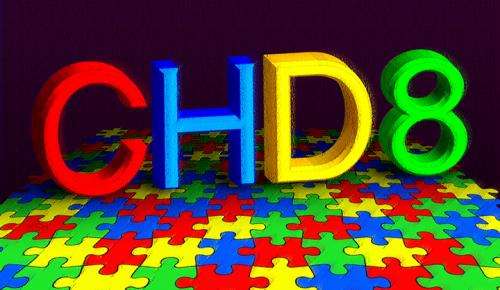Study shows connection between key autism risk genes in the human brain

A new study reveals an important connection between dozens of genes that may contribute to autism, a major step toward understanding how brain development goes awry in some individuals with the disorder.
The research shows that CHD8, a gene that is strongly linked to autism, acts as a master regulator in the developing human brain and controls the expression of many other genes. Many of the genes it targets have also been implicated in the disorder, the researchers found.
The study, led by James P. Noonan, associate professor of genetics and of ecology and evolutionary biology, is published March 10 in the journal Nature Communications.
"Strong genetic evidence has identified a set of regulatory genes as being important for autism risk. But it has been difficult to gain insight into the biological mechanisms that might be perturbed because we couldn't functionally connect these genes with each other. Now, we can," said Noonan, a member of the Kavli Institute for Neuroscience, and senior author of the study.
Recent studies have identified several dozen genes potentially associated with autism. In the past three years, the gene CHD8 has emerged as one of the strongest candidates. Individuals with a loss-of-function mutation in this gene, which inactivates the corresponding protein, are very likely to have an autism diagnosis.
CHD8 is thought to regulate gene expression by modifying the way DNA interacts with histones, proteins present in the nucleus of every cell that wind long strands of DNA like a spool. Until now, however, it has been unclear which genes CHD8 targets in the brain and whether these genes also play a role in autism.
By building out the network of genes regulated by CHD8, the researchers aim to understand which biological processes are disrupted by the harmful mutations in these genes that affect some individuals with the disorder.
To answer these questions, Noonan and his colleagues first identified sites in the genome that were bound by CHD8 in cells from the developing brains of humans and mice as well as cultured human neuronal stem cells. They found that CHD8 binds to thousands of targets in each tissue. Many of these binding sites were conserved across the two species, suggesting that CHD8 regulates genes that are broadly important for brain development in mammals.
Next, they looked to see whether CHD8 was regulating genes implicated in autism by previous genetic studies, including a study led by co-authors and Nenad Sestan of Yale's Kavli Institut of Neuroscience and Matthew State, formerly of Yale and now at the University of California-San Francisco. They found that these autism-associated genes were more likely to be targeted by CHD8 than expected by chance, in both humans and mice.
To evaluate whether CHD8 directly regulated these other autism risk genes, the researchers reduced the expression of the CHD8 gene in cultured human neuronal stem cells and explored what, if any, gene expression levels changed. They found that depletion of CHD8 dysregulated many of its target genes; however, autism risk genes were most strongly affected.
"Our results really point to CHD8 as being a major regulator of a whole network of genes that are involved in autism," said Justin Cotney, the first author on the paper and associate research scientist in the Noonan lab. "What's so exciting about these findings is that we can use these data to predict additional autism genes, which before we had limited power to do."
The new study begins to simplify the complex web of genes that may be involved in autism by investigating the targets of genes that have been linked to the disorder in a systematic way. The researchers are currently investigating the regulatory roles of the genes targeted by CHD8 in brain tissue.
"We believe this will help reveal specific biological pathways and developmental processes that are affected in autism," Noonan said.



















